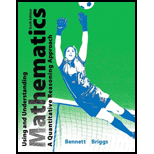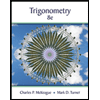
Concept explainers
Recognizing Fallacies. In the following arguments, identify the premise(s) and conclusion, explain why the argument is deceptive, and , if possible, identify the type of fallacy it represents.
25. Obesity among Americans has increased steadily; as has the sale of video games. It follows that video games are compromising the health of Americans.
26. The polls show the Republican candidate leading by a 2-to-1 margin, so you should vote for the Republican.
27. All the mayors of my hometown have been men, which shows that men are better qualified for high office than women.
28. My father tells me that I should exercise daily. But he never exercised when he was young, so I see no need to follow his advice.
29. My baby was vaccinated and later developed autism, which is why I believe that vaccines cause autism.
30. The state has no right to take a life, so the death penalty should be abolished.
31. Everyone loves Shakespeare, because his plays have been read for many centuries.
32. Claims that GMO foods are unsafe are ridiculous, as I’ve never heard of anyone getting sick from them.
33. I will not give money to the earthquake relief effort. Alter I last gave to a charity, an audit showed that most of the money was used to pay its administrators in the front office.
34. It’s not surprising that President Obama’s budget contains spending increases. Democrats don’t care about taxpayers’ money.
35. The Congressperson is a member of the National Rifle Association, so I’m sure she will not support a ban on assault rifles.
36. My three friends who drink wine have never had heart attacks. My two friends who have had heart attacks are non-drinkers. Drinking wine is clearly a good therapy.
37. Responding to Republicans who want to end the estate tax, which falls most heavily on the wealth, a Democrat says, "The Republicans think that rich people aren’t rich enough."
38. The Wyoming toad has not been seen outside of captivity since 2002, so it must be extinct in the wild.
39. My little boy loves dolls and my little girl loves trucks, so there’s no truth to the claim that boys are more interested in mechanical toys while girls prefer maternal toys.

40. Responding to Democrats who want to raise the fuel efficiency standards for new cars and trucks, a Republican says, "Democrats think that government is the solution to all our problems….
Want to see the full answer?
Check out a sample textbook solution
Chapter 1 Solutions
Using and Understanding Mathematics: A Quantitative Reasoning Approach plus NEW MyMathLab with Pearson eText -- Access Card Package (6th Edition) (Bennett Science & Math Titles)
- d((x, y), (z, w)) = |xz|+|yw|, show that whether d is a metric on R² or not?. Q3/Let R be a set of real number and d: R² x R² → R such that -> d((x, y), (z, w)) = max{\x - zl, ly - w} show that whether d is a metric on R² or not?. Q4/Let X be a nonempty set and d₁, d₂: XXR are metrics on X let d3,d4, d5: XX → R such that d3(x, y) = 4d2(x, y) d4(x, y) = 3d₁(x, y) +2d2(x, y) d5(x,y) = 2d₁ (x,y))/ 1+ 2d₂(x, y). Show that whether d3, d4 and d5 are metric on X or not?arrow_forwardplease Solve questions by Course Name( Ordinary Differential Equations II 2)arrow_forwardBusiness discussarrow_forward
- please do Q3arrow_forwardUse the properties of logarithms, given that In(2) = 0.6931 and In(3) = 1.0986, to approximate the logarithm. Use a calculator to confirm your approximations. (Round your answers to four decimal places.) (a) In(0.75) (b) In(24) (c) In(18) 1 (d) In ≈ 2 72arrow_forwardFind the indefinite integral. (Remember the constant of integration.) √tan(8x) tan(8x) sec²(8x) dxarrow_forward
- Find the indefinite integral by making a change of variables. (Remember the constant of integration.) √(x+4) 4)√6-x dxarrow_forwardInThe Northern Lights are bright flashes of colored light between 50 and 200 miles above Earth. Suppose a flash occurs 150 miles above Earth. What is the measure of arc BD, the portion of Earth from which the flash is visible? (Earth’s radius is approximately 4000 miles.)arrow_forwardJu at © Ju 370 = x (- пье zxp = c² (2² 4 ) dx² ахе 2 nze dyz t nzp Q/what type of partial differential equation (PDE) are the following-arrow_forward
 Big Ideas Math A Bridge To Success Algebra 1: Stu...AlgebraISBN:9781680331141Author:HOUGHTON MIFFLIN HARCOURTPublisher:Houghton Mifflin Harcourt
Big Ideas Math A Bridge To Success Algebra 1: Stu...AlgebraISBN:9781680331141Author:HOUGHTON MIFFLIN HARCOURTPublisher:Houghton Mifflin Harcourt Holt Mcdougal Larson Pre-algebra: Student Edition...AlgebraISBN:9780547587776Author:HOLT MCDOUGALPublisher:HOLT MCDOUGAL
Holt Mcdougal Larson Pre-algebra: Student Edition...AlgebraISBN:9780547587776Author:HOLT MCDOUGALPublisher:HOLT MCDOUGAL Glencoe Algebra 1, Student Edition, 9780079039897...AlgebraISBN:9780079039897Author:CarterPublisher:McGraw Hill
Glencoe Algebra 1, Student Edition, 9780079039897...AlgebraISBN:9780079039897Author:CarterPublisher:McGraw Hill Trigonometry (MindTap Course List)TrigonometryISBN:9781305652224Author:Charles P. McKeague, Mark D. TurnerPublisher:Cengage Learning
Trigonometry (MindTap Course List)TrigonometryISBN:9781305652224Author:Charles P. McKeague, Mark D. TurnerPublisher:Cengage Learning



